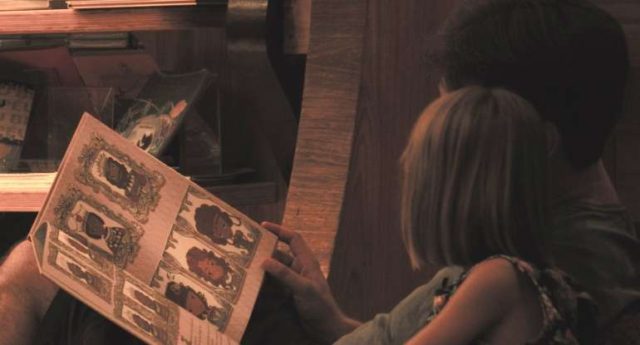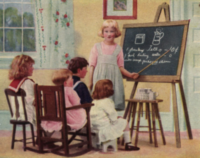Part 1: When I Think Back on All the Cr*p I Learned in High School
 In free education, you get what you pay for.
In free education, you get what you pay for.
At one point, in the six long years of infertility before the birth of number one son, we were going to homeschool. In fact, I collected books and all, planning on using them to teach the child.
And then the child arrived. At some point when Robert Anson (Yes, when you name your child that, you get exactly what you deserve) was three, a friend gave me a book called “Raising the self-willed child.” Don’t bother finding it, or at least not that particular one (I imagine there’s more than one book of that name). It was based on the idea that if your child had sufficient self-esteem he would be miraculously docile.
Even at 30, I wasn’t stupid enough to believe that. So I brought Robert up as I (a self-willed child. Okay, my parents had other words for me) had been brought up: with mild physical discipline, until he was old enough to understand other forms of discipline. That is to say, for a while there the greatest punishment we could inflict was to remove his computer cord for a day or to make him copy three pages of whatever historical book first came to hand, in as good a handwriting as he could use. He still remembers both of those punishments with shudders, but it did wonders for his vocabulary. His penmanship still sucks. I blame doing most of his work on a keyboard. Or maybe being my son. (My penmanship is best described as “dragging a spider dipped in ink all over a paper.”)
My first son was unexpectedly creative in forms of misdeeds. I think very few children made it a regular activity to defeat locks, remove all their clothing, and go running through the neighborhood in the middle of the night. Since this was a downtown neighborhood, it wasn’t even a safe thing to do.
My second son was unexpectedly sickly, suffering from asthma and a tendency to epic colds and pneumonia.
Add to that that when younger son was one, I myself managed to have a form of intercellular pneumonia that landed me in ICU for 11 days, and left me weakened for about two years.
All this to say that when it was time for older son to enter school, we meekly registered him for kindergarten. I simply couldn’t keep up with both of them, much less follow a coherent curriculum, when I was sleeping several hours a day, and my husband was in the part of his professional career where 18-hour days weren’t unusual. More during software-release pushes.
The school in the little mountain town we lived in was pleasant and nice, it gave Robert – always a solitary child – contact with other kids, and he seemed to be learning. Oh, not to read and write, since he already knew that when he entered school, but stuff about other countries (they studied Japan, for instance, at the superficial level you do in kindergarten), and he didn’t refuse to go to school, and he continued to read a lot. As for me, I got eight quiet hours to get the Victorian we lived in remodeled, do some writing, and look after a younger son.
It wasn’t until Robert was in third grade that I got my “Have Spacesuit Will Travel” moment. (Those of you who have read Heinlein’s book will get it.)
I will grant you my experience of elementary school wasn’t normal for an American my age. For one, I went to elementary school in Portugal. For another, it was a village school, with an elderly teacher who used the books my parents (and maybe my grandparents) had used because she would have to answer to THEM if they didn’t like her work.
By third grade, we were expected to write a coherent essay (yes, I did forget it since then. Why do you ask?) on an assigned subject. And while, if the teacher was feeling poorly, we might be assigned what seemed a frivolous subject like “why dogs are man’s best friend” you were absolutely expected to at least wave at the history of dogs and humans, with reference to Roman tombs, etc. (Or, if you were me, write a story of humans and dogs in space. I think I got good grades because the teacher thought I was crazy.)
My son in third grade was assigned to do an essay on “My best friend.” He proudly showed me a paragraph. And I hit the roof.
The sentences – as far as I could tell through the horrible spelling – were ungrammatical and incoherent. There was no thought progression, nothing the reader could follow. It was as though he thought if he included “my best friend” in every sentence it would work, even if it was “my best friend is rocket fire.” It read like absurdist poetry. And it was maybe all of 300 words.
I thought, “He’s ill. He’s having a bad day.” So we went into his book bag (my son hates the very concept of lockers. Still does) and looked at his graded essays. They were all As. They were all horrible. The teacher routinely gushed about his writing in parent-teacher conferences. I later had reason to realize that the fact he could write at all, with words and everything, as his younger brother would say, was amazing to his teachers.
Which didn’t make any of this better. Further inquiry elicited information that they weren’t actually teaching spelling or grammar or any of that stuff because it was better if the students picked it up “organically” because it encouraged “self-expression.”
Of course, what it mostly encouraged was incoherence.
So I dug out my books on “English for Foreign Learners.” I figured by then it was what my poor child had become. I started assigning him grammar exercises and spelling lists (they actually introduced these in fourth grade, probably because of parent rebellion. They were mostly puerile words the kids should have known). When he got home from school, there was work to do. He got published professionally at thirteen. And he can write with verve, fluency, and coherence, as can his brother.
But this is not the story of my triumph. It is the story of public school fail. It seemed like every time I looked around they had found new ways of failing. In fourth grade, Robert thought that glass was a non-renewable material and threw a fit when we failed to recycle a bottle. In second grade, Marshall approached a group of bikers to chide them about smoking, because he’d been taught to do so. He’d also been taught people who smoked were bad people, making other people ill.
History…. Don’t get me started. Most of the history books now in use in the U.S. are based on the work of not-so-crypto communist Howard Zinn. I leave it to you to guess how favorable to the U.S. those books are.
It seemed every time we turned around there was another thing I needed to teach them and correct.
I don’t think the school-fail is deliberate. No, I know, you’d think so, because it creates stupid and docile subjects. But you have to think of how the left sees itself, not of how we see it. They think they’re smart and on the side of science.
BUT after decades of education colleges admitting people whose low GPAs shut them out of everything else, and of education being the playground of ideological monsters like Bill Ayers, the result is teachers who can’t teach even while doing their best, and who have no clue what the truth – as opposed to their indoctrination agenda – is.
And that’s why public schools are unimaginably bad. And I mean that literally. Those of us in our forties and fifties cannot imagine how badly our kids are being taught. Not unless we go and see. So go and see, and access the damage.
What I can guarantee is that if you do nothing, your children will be like a lot of college students whose parents ask me to help them: unable to express themselves in writing, unable to see beyond the indoctrination they were taught, unable to think for themselves.
If you don’t want that, it’s time to roll up your sleeves and get to work.
Part 2: Teach Your Children Well
The obvious solution is to teach your children yourself.

By the time younger son went to school, despite all the failings of the older child’s schooling, we were afraid to homeschool.
Why?
Because as in everything else that parents used to do at home and for which now people need a degree, there was a forest of regulations and “must learns” that made me terrified that my kids would come to the age of entering college and be told that they couldn’t enter because they hadn’t learned to warble their knabble back in fourth grade.
Sure, most of the “required” stuff was ridiculous button counting. Which is why I was afraid I couldn’t do it/would forget to do it.
So we kept them in school and taught them at home, in what I would call a “mixed” solution. (More on that later.)
This continued until younger son ran into issues (mostly consisting of being harassed by 18 girls, and having the school administration side with the girls) in 6th grade. The situation turned toxic, and we decided to bring him home to homeschool.
And then I realized it wasn’t nearly as difficult as it had been portrayed, and in fact, it wasn’t nearly as difficult as it had been when the kids started school.
There were at the time (there might no longer be. Colorado did some weird things to homeschooling in 2008) these organizations called “umbrella schools.” They supervised/approved your curriculum, reminded you of things that were required, made sure the kids took the required-by-the-state exams, and certified your kids as having passed various grades.
This is particularly important if you are unschooling (i.e. integrating lessons as part of everyday life) or if your kid is like mine was, a free-grazer. As it was the umbrella school lady kept pulling out her hair because she wasn’t sure how to classify two months spent studying the mechanisms by which effects were achieved in Shakespearean and ancient Greek plays, and comparing the two.
There are other options we didn’t use, including an online state school, in which your child can take lessons at home on his/her own that exactly follow the state curriculum. (Not sure this is better than sending them to school, but it could be a side thing, just to make sure they have the right certifications.)
But there are a ton of other online options if you only explore. My son took Greek (and I took Greek and Latin) in an online school that no longer exists. In fact, there are online courses for everything, from math to Chinese. We also made a lot of use of Great Courses teaching.
After a year (in which he completed two years) my son chose to enter a local high school, because it had a dual college/high school program, and he wanted to study engineering and enter the robotics team.
By then, though, I’d realized what a mistake I’d made in not homeschooling.
If you are afraid of homeschooling, don’t be. Investigate it in your area. I bet you’ll find all sorts of options, both local and online, that make sure your child learns what he/she needs to, probably better than in public school.
As for the vaunted “socialization,” there are many ways to socialize, and they don’t have to be with peers. Although my family fell outside the scope of homeschooling groups in our area, which seemed to be divided between religious and “unschoolers” (we are religious, that was simply not the main reason we were homeschooling) we found plenty of ways for son to socialize: from volunteering to taking local art classes. He did okay, even if he went back to school with a rather more mature social style than his peers.
After son had gone back to school I found a third “mixed” option for homeschooling/public school, which I wish I had thought of up front.
About 2/3 of this elite, highly demanding program was kids who had entered school for the first time in 10th grade. This seemed to be how parents who’d homeschooled ensured the kids had the credentials needed to enter colleges that might frown at homeschooling (and a lot still do).
In fact, that had been my main fear, since a lot of homeschooling parents seemed to count it a victory if their children finished high school and could hold down a retail job. It is a victory compared to living on the streets or in mom and dad’s basement forever, but my sons showed an interest in STEM very early on, so I wanted to make sure they had that option open to them.
The trick of homeschooling through ninth grade, then enrolling them in your local high school (preferably in a gifted/exclusive program) seems to work. Most of my son’s classmates got into very prestigious schools or programs.
But what if you can’t homeschool at all? You both have jobs because taxes/health insurance (but I repeat myself) are insane; there is no way you could live on one income; if you leave the kids alone at home, they’ll just goof off.
Well, then you’re into the “mixed option” which means teaching your kids after school. It’s a lot of work because it means correcting the crazy stuff they were taught in school. But it can be done.
Part 3: The Subversive Way to Homeschool
 There is a subversive way to homeschool.
There is a subversive way to homeschool.
So there is no way you can homeschool your children. I get it. Ignore the scolds who tell you that you still must. For us, homeschooling full time and for much of our child-raising years would mean one of us quitting his job, losing the house we had a mortgage on, stopping maintenance on our perpetually dying car, and possibly going on government assistance.
And don’t ask me what is more important than teaching my children. There are tons of things you teach your children. What they tend to actually retain is what you model.
Going on assistance would be the opposite of what we wanted to teach them. We wanted to model being working people and the rewards of hard work.
But yeah, we also wanted them to not learn idiocy, which is what they were learning in school.
So what we did was teach them after they came home from school. Sneaky, uh?
Sure, it meant we didn’t/couldn’t watch any shows in the evening, and other types of entertainment were limited to things like visiting museums or taking courses together. Because all the time after school and after the mandatory button-counting “homework” was devoted to teaching them.
 Actually, this started with homework, like explaining to them why, no, we weren’t giving them a copy of our budget as the basis for homework, as the teacher asked. Even though we had nothing to hide, it was none of his class’s business. So we were going to make one up. Or when they asked Robert to color on a map where his ancestors came from, and I told him to color everything, even the sea, then explained both why it was true (if you go back far enough) and why the assignment was pernicious, dividing Americans into hyphenated groups. Or when I explained why the school’s definition of “culture” as “genetic heritage” was wrong, and in fact at the root of a bunch of progressive errors. (If you’re one of those people who doesn’t know, genetics might give you certain abilities and tendencies, but they’re not culture. A Chinese infant brought up by an American couple is American. The idea that culture is inborn and non-changeable is what leads progressives to call us racist when we criticize Islam, or to think it’s “racist” to demand immigrants learn English. They think that’s objectively impossible since you’re born with one culture and one language. For the record, I’m writing this in my third language and the idea of inborn culture is a pernicious lie.)
Actually, this started with homework, like explaining to them why, no, we weren’t giving them a copy of our budget as the basis for homework, as the teacher asked. Even though we had nothing to hide, it was none of his class’s business. So we were going to make one up. Or when they asked Robert to color on a map where his ancestors came from, and I told him to color everything, even the sea, then explained both why it was true (if you go back far enough) and why the assignment was pernicious, dividing Americans into hyphenated groups. Or when I explained why the school’s definition of “culture” as “genetic heritage” was wrong, and in fact at the root of a bunch of progressive errors. (If you’re one of those people who doesn’t know, genetics might give you certain abilities and tendencies, but they’re not culture. A Chinese infant brought up by an American couple is American. The idea that culture is inborn and non-changeable is what leads progressives to call us racist when we criticize Islam, or to think it’s “racist” to demand immigrants learn English. They think that’s objectively impossible since you’re born with one culture and one language. For the record, I’m writing this in my third language and the idea of inborn culture is a pernicious lie.)
But then we’d branch into other things. We never established a curriculum for these after-school sessions, but I see no reason you shouldn’t. Get hold of some Great Courses, or some school books published before the fifties. Then design a curriculum, and use it. It’s not difficult, truly. If you have a high school education and a willingness to poke around and inform yourself, there is no reason as a normal, intelligent adult you can’t teach your children. Throughout most of human history, parents taught their children. Yeah, our world is more complex, but not really. Do you think it would be easier to teach your children to hunt and gather or navigate the religious/political complexity of Elizabethan England? At least you can find experts online to teach your kids that which you can’t teach them yourself.
Most of what you’ll do if your kids go to public school is “work on what’s been spoiled.” A lot of what you’ll do is teach your kids to think clearly and express themselves with fluency. Most of what they need for that is a good reading list, and to be required to write essays. (There are books on how to format essays. I used my college book on “How to write a precis.” Yes, my books were from Great Britain.) For grammar, I recommend Strunk and White, though there are any number of grammar exercise books on the market, which help.
Other than that, this mixed method of schooling will force you to learn things. You can’t explain to your kid why, in most states, saving water is a fool’s game if you don’t know the water cycle (most of their teachers don’t know it and think water is a non-renewable resource). You might also have to study glass manufacturing because otherwise your kid will think glass is a non-renewable resource.
But there are more fun things, too. As my kids became interested in things from ancient languages to game theory, we followed them into those things so we could learn/teach/discuss them.
Again, courses from the Teaching Company are invaluable. Some of them suffer from a progressive taint, but that’s easily identified and disposed of with education. Most of them are just pure geekery and a love of learning, though.
Yes, they’re expensive. There is a reason we dress from thrift stores, the kids never owned a gaming system (though they’ve each owned a PC most of their lives), and neither of them did a semester abroad.
I know, the country has free education. Why should you have to teach your children when they should be taught at school?
Because collective systems run for the government are always and ultimately run for two groups of people: government bureaucrats, and the people running the program.
If you don’t pay for it, and particularly if it’s mandatory, they have no reason to do what you want.
You brought these children into the world. They’re your responsibility. Besides, if you’re a normal parent, you want them to be happy, fulfilled adults.
You decide how much of an effort and sacrifice you can make for their education. And then you make it.
But don’t delude yourself that third parties will do it the right way.
They won’t.
The Communist Manifesto specified that all children should be brought up by the state and kept away from the parents so that they’d learn the correct doctrine.
If you put your children in public school – no matter how pleasant and innocuous seeming – and trust them to teach your offspring, that’s all the kids will learn: the correct doctrine.
If that is not what you want, you’re going to have to roll up your sleeves and take charge of your own progeny.
The future belongs to those who show up, and showing up intellectually means that you don’t let others fill your kids’ head with their indoctrination.
Go forth and teach.
Will there be more to come for this fantastic series? Let us hope so. (Ed.)
Written by Sarah Hoyt and published by PJ Media July 13, July 14, and July 16 2017.
 FAIR USE NOTICE: This site contains copyrighted material the use of which has not always been specifically authorized by the copyright owner. We are making such material available in our efforts to advance understanding of environmental, political, human rights, economic, democracy, scientific, and social justice issues, etc. We believe this constitutes a ‘fair use’ of any such copyrighted material as provided for in section 107 of the US Copyright Law. In accordance with Title 17 U. S. C. Section 107, the material on this site is distributed without profit to those who have expressed a prior interest in receiving the included information for research and educational purposes. For more information go to: http://www.law.cornell.edu/uscode/17/107.shtml
FAIR USE NOTICE: This site contains copyrighted material the use of which has not always been specifically authorized by the copyright owner. We are making such material available in our efforts to advance understanding of environmental, political, human rights, economic, democracy, scientific, and social justice issues, etc. We believe this constitutes a ‘fair use’ of any such copyrighted material as provided for in section 107 of the US Copyright Law. In accordance with Title 17 U. S. C. Section 107, the material on this site is distributed without profit to those who have expressed a prior interest in receiving the included information for research and educational purposes. For more information go to: http://www.law.cornell.edu/uscode/17/107.shtml
